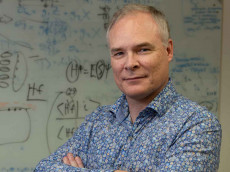Bert de Jong Promoted to Editor of Computer Physics Communication
July 6, 2022
By Linda Vu
Bert de Jong, acting head of Berkeley Lab’s Computer Science Department, has been promoted to principal editor of Computer Physics Communications (CPC), an international journal and program library for computational physics and physical chemistry. Computer Physics Communications publishes research papers and computer program descriptions in computational physics and physical chemistry: the focus is on computational methods and techniques rather than results. The journal's Editorial Board consists of leaders in computational physics.
De Jong was appointed to CPC’s editorial board in March 2016. In his newly elevated role, he plans on using his influence to diversify the journal’s editorial board and authors.
“Diversifying the computing community is important to me, and the reality is that a lot of young people who consider pursuing careers in these fields don’t see that they fit or feel like they belong. That’s a big challenge,” said de Jong. “At this point, I strongly believe that a part of the solution is equity, meaning we need to spotlight these underrepresented voices and give them a bigger platform to stand on.”
To elevate these perspectives, de Jong will appoint specialist editors that are gender and culturally diverse, which means seeking out experts from typically overlooked parts of the world like Africa, South America, Southeast Asia, etc. He also hopes to publish more “special issues” of CPC to highlight the innovative research being done in these parts of the globe and from experts not typically represented in the journal.
De Jong’s background is computational chemistry, and his research at Berkeley Lab spans quantum computing, exascale computing, and machine learning for chemistry and materials research. In addition to his role as department head, de Jong also leads Berkeley Lab’s Applied Computing for Scientific Discovery Group, which advances scientific computing by developing and enhancing applications in key disciplines, as well as tools and libraries for addressing general problems in computational science.
About Berkeley Lab
Founded in 1931 on the belief that the biggest scientific challenges are best addressed by teams, Lawrence Berkeley National Laboratory and its scientists have been recognized with 16 Nobel Prizes. Today, Berkeley Lab researchers develop sustainable energy and environmental solutions, create useful new materials, advance the frontiers of computing, and probe the mysteries of life, matter, and the universe. Scientists from around the world rely on the Lab’s facilities for their own discovery science. Berkeley Lab is a multiprogram national laboratory, managed by the University of California for the U.S. Department of Energy’s Office of Science.
DOE’s Office of Science is the single largest supporter of basic research in the physical sciences in the United States, and is working to address some of the most pressing challenges of our time. For more information, please visit energy.gov/science.










